
Shownotes
Wisdom-Trek / Creating a Legacy
Welcome to Day 978 of our Wisdom-Trek, and thank you for joining me.
This is Guthrie Chamberlain, Your Guide to Wisdom
The Enneagram System – Type Number Six – The Loyalist – Ask Gramps
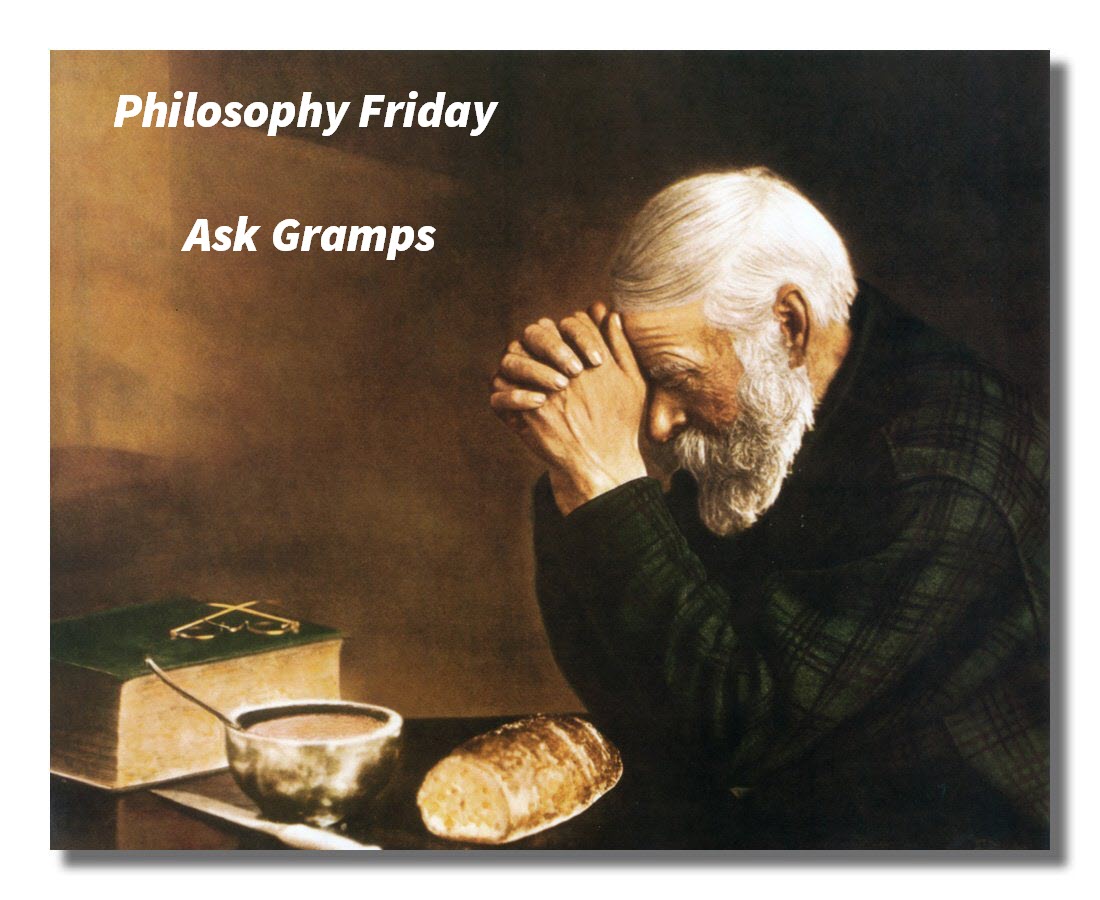
Thank you for joining us for our five days per week wisdom and legacy building podcast. We are broadcasting from our studio at The Big House in Marietta, Ohio. This is Day 978 of our trek, and it is time for our Philosophy Friday series. Each Friday we will ponder some of the basic truths and mysteries of life and how they can impact us in creating our living legacy.
As we continue on this trek called life, sometimes we have questions about life, so our Friday trek is a time when we can “Ask Gramps.” Gramps will answer questions that you would like to ask your dad or granddad, but for whatever reason you are unable to. No matter how old we are, I know that all of us would like the opportunity to ask Dad or Gramps questions about life in many areas.
Today is the thirteenth episode in our series delving into what makes each of us respond differently to life situations and circumstances. Understanding ourselves and how others may interpret life through their paradigm will allow us to interact with each other with more love and compassion. This empathy can be achieved by utilizing a profound tool called “The Enneagram.”
If you have missed any of our past twelve Friday series, I would recommend going back and listen to them or read the Wisdom Journals. As a review, the tool that we refer to as the Enneagram (Any-a-Gram) is a circle with nine interconnected points (Ennea refers to 9, and Gram refers to a drawing).
Check out today’s or a prior week’s Wisdom Journal for a representation of it. I have also included a copy of “The Enneagram At-A-Glance,” which was compiled by Suzanne H. Eller in today’s Wisdom Journal. If you would like a PDF copy, click on the link in today’s Wisdom Journal located on our website Wisdom-Trek.com.
I would also recommend the book The Road Back to You written by Ian Morgan Cron and Suzanne Stabile. It is an excellent book about an enneagram journey to self-discovery from a Christian perspective.
In the first seven episodes, we explored how the Enneagram system works and then presented an overview of all nine personality types. So far we took a deep dive into “The Reformer,” “The Helper,” “The Achiever,” “The Individualist,” and “The Investigator.” This week we will explore type Number Six “The Loyalist.” Next week we will focus on type number seven “The Enthusiast.”
Since we are exploring the Enneagram in detail, I would also recommend reading the Wisdom Journal for each Friday to see the diagrams presented each week. As helpful as the Enneagram is, keep in mind, it is still only a tool and cannot replace or usurp the precepts that are found in God’s Word. All decisions and actions that we make in life must be in harmony with God’s precepts.
So the questions for the next several months will be…
“Hey, Gramps, why do people act and react to situations and circumstances in life differently? How can I gain wisdom to better understand myself and others so that I can love, serve, and minister to them on a deeper level?”
The Enneagram System – Type Number Six – The Loyalist
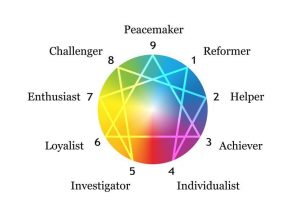
6 – THE LOYALIST
Enneagram Type Six
The Committed, Security-Oriented Type: Engaging, Responsible, Anxious, and Suspicious
· Type Six in Brief
The committed, security-oriented type. Sixes are reliable, hard-working, responsible, and trustworthy. Excellent “troubleshooters,” they foresee problems and foster cooperation, but can also become defensive, evasive, and anxious—running on stress while complaining about it. They can be cautious and indecisive, but also reactive, defiant and rebellious. They typically have problems with self-doubt and suspicion.
At their Best: internally stable and self-reliant, courageously championing themselves and others.
Basic Fear: Of being without support and guidance
Basic Desire: To have security and support
Enneagram Six with a Five-Wing: “The Defender”
Enneagram Six with a Seven-Wing: “The Buddy”
Key Motivations: Want to have security, to feel supported by others, to have certitude and reassurance, to test the attitudes of others toward them, to fight against anxiety and insecurity.
· The Meaning of the Arrows (in brief)
When moving in their Direction of Disintegration (stress), dutiful Sixes suddenly become competitive and arrogant like an unhealthy Three. However, when moving in their Direction of Integration (growth), fearful, pessimistic Sixes become more relaxed and optimistic, like a healthy Nine.
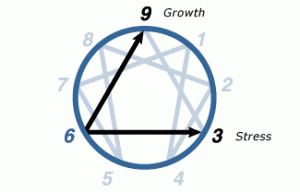
· Type Six Overview
We have named personality type Six “The Loyalist” because of all the personality types, Sixes are the most loyal to their friends and to their beliefs. They will “go down with the ship” and hang on to relationships of all kinds far longer than most other types. Sixes are also loyal to ideas, systems, and beliefs—even to the belief that all ideas or authorities should be questioned or defied.
Indeed, not all Sixes go along with the “status quo”—their beliefs may be rebellious and anti-authoritarian, even revolutionary. In any case, they will typically fight for their beliefs more fiercely than they will fight for themselves, and they will defend their community or family more tenaciously than they will defend themselves.
The reason Sixes are so loyal to others is that they do not want to be abandoned and left without support—their Basic Fear. Thus, the central issue for type Six is a failure of self-confidence. Sixes come to believe that they do not possess the internal resources to handle life’s challenges and vagaries alone, and so increasingly rely on structures, allies, beliefs, and supports outside themselves for guidance to survive. If suitable structures do not exist, they will help create and maintain them.
Sixes are the primary type in the Thinking Center, meaning that they have the most trouble contacting their own inner guidance. As a result, they do not have confidence in their own minds and judgments.
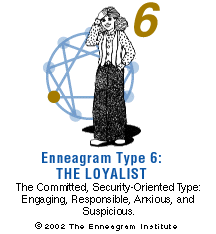
This does not mean that they do not think. On the contrary, they think—and worry—a lot! They also tend to fear making important decisions, although, at the same time, they resist having anyone else make decisions for them. They want to avoid being controlled, but are also afraid of taking responsibility in a way that might put them “in the line of fire.” (The old Japanese adage that says, “The blade of grass that grows too high gets chopped off” relates to this idea.)
Sixes are always aware of their anxieties and are always looking for ways to construct “social security” bulwarks against them. If Sixes feel that they have sufficient backup, they can move forward with some degree of confidence. But if that crumbles, they become anxious and self-doubting, reawakening their Basic Fear, “I’m on my own! What am I going to do now?” A good question for Sixes might, therefore, be, “When will I know that I have enough security?” Or, to get right to the heart of it, “What is security?” Without essential inner guidance and the deep sense of support that it brings, Sixes are constantly struggling to find firm ground.
Sixes attempt to build a network of trust over a background of unsteadiness and fear. They are often filled with a nameless anxiety and then try to find or create reasons why. Wanting to feel that there is something solid and clear-cut in their lives, they can become attached to explanations or positions that seem to explain their situation. Because “belief” (trust, faith, convictions, and positions) is difficult for Sixes to achieve, and because it is so important to their sense of stability, once they establish a trustworthy belief, they do not easily question it, nor do they want others to do so.
The same is true for individuals in a Six’s life. Once Sixes feel they can trust someone, they go to great lengths to maintain connections with the person who acts as a sounding board, a mentor, or a regulator for the Six’s emotional reactions and behavior. They, therefore, do everything in their power to keep their affiliations going…“If I don’t trust myself, then I have to find something in this world I can trust.”
Here is an example. Although intelligent and accomplished, Connie still has to wrestle with the self-doubt of her type.
“As my anxiety has come under control, so has my need to ‘check out’ everything with my friends. I used to have to get the nod of approval from several hundred (just joking!) ‘authorities.’ About nearly every decision would involve a council of my friends. I usually would do this one on one. ‘What do you think, Mary? If I do this, then that might happen.’ Please make up my mind for me!’…Recently, I’ve narrowed my authorities to just one or two trusted friends, and on occasion, I’ve actually made up my own mind!”
Until they can get in touch with their own inner guidance, Sixes are like a ping-pong ball that is constantly shuttling back and forth between whatever influence is hitting the hardest in any given moment. Because of this reactivity, no matter what we say about Sixes, the opposite is often also as true. They are both strong and weak, fearful and courageous, trusting and distrusting, defenders and provokers, sweet and sour, aggressive and passive, bullies and weaklings, on the defensive and on the offensive, thinkers and doers, group people and soloists, believers and doubters, cooperatives and obstructionists, tender and mean, generous and petty—and on and on. It is the contradictory picture that is the characteristic “fingerprint” of Sixes, the fact that they are a bundle of opposites.
The biggest problem for Sixes is that they try to build safety in the environment without resolving their own emotional insecurities. When they learn to face their anxieties, however, Sixes understand that although the world is always changing and is by nature uncertain, they can be serene and courageous in any circumstance. And they can attain the greatest gift of all, a sense of peace with themselves despite the uncertainties of life.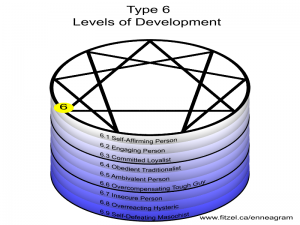
· Type Six —Levels of Development
Healthy Levels
Level 1 (At Their Best): Become self-affirming, trusting of self and others, independent yet symbiotically interdependent and cooperative as an equal. Belief in self leads to true courage, positive thinking, leadership, and rich self-expression.
Level 2: Able to elicit strong emotional responses from others: very appealing, endearing, lovable, and affectionate. Trust important: bonding with others, forming permanent relationships and alliances.
Level 3: Dedicated to individuals and movements in which they deeply believe. Community builders: responsible, reliable, and trustworthy. Hard-working and persevering, sacrificing for others; they create stability and security in their world, bringing a cooperative spirit.
Average Levels
Level 4: Start investing their time and energy into whatever they believe will be safe and stable. Organizing and structuring, they look to alliances and authorities for security and continuity. Constantly vigilant, anticipating problems.
Level 5: To resist having more demands made on them, they react against others passive-aggressively. Become evasive, indecisive, cautious, procrastinating, and ambivalent. Are highly reactive, anxious, and negative, giving contradictory “mixed signals.” Internal confusion makes them react unpredictably.
Level 6: To compensate for insecurities, they become sarcastic and belligerent, blaming others for their problems, taking a tough stance toward “outsiders.” Highly reactive and defensive, dividing people into friends and enemies, while looking for threats to their own security. Authoritarian while fearful of authority, highly suspicious, yet conspiratorial and fear-instilling to silence their own fears.
Unhealthy Levels
Level 7: Fearing that they have ruined their security, they become panicky, volatile, and self-disparaging with acute inferiority feelings. Seeing themselves as defenseless, they seek out a stronger authority or belief to resolve all problems. Highly divisive, disparaging, and berating others.
Level 8: Feeling persecuted that others are “out to get them,” they lash-out and act irrationally, bringing about what they fear. Fanaticism, violence.
Level 9: Hysterical, and seeking to escape punishment, they become self-destructive and suicidal. Alcoholism, drug overdoses, “skid row,” self-abasing behavior. Generally corresponds to the Passive-Aggressive and Paranoid personality disorders.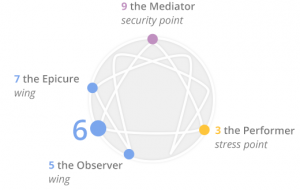
Personal Growth Recommendations for Enneagram Type Six
- Remember that there is nothing unusual about being anxious since everyone is anxious and much more often than you might think. Learn to be more present to your anxiety, to explore it, and to come to terms with it. Work creatively with your tensions without turning to excessive amounts of alcohol (or other drugs) to allay them. In fact, if you are present and breathing fully, anxiety can be energizing, a kind of tonic that can help make you more productive and aware of what you are doing.
- You tend to get edgy and testy when you are upset or angry, and can even turn on others and blame them for things you have done or brought on yourself. Be aware of your pessimism. It causes your dark moods and negative thought patterns that you tend to project on reality. When you succumb to this self-doubt, you can become your own worst enemy and may harm yourself more than anyone else does.
- Sixes tend to overreact when they are under stress and feeling anxious. Learn to identify what makes you overreact. Also, realize that almost none of the things you have feared so much has actually come true. Even if things are as bad as you think, your fearful thoughts weaken you and your ability to change things for the better. You cannot always manage external events, but you can manage your own thoughts.
- Work on becoming more trusting. There are doubtless several people in your life you can turn to who care about you and who are trustworthy. If not, go out of your way to find someone trustworthy, and allow yourself to get close to that person. This will mean risking rejection and stirring up some of your deepest fears, but the risk is worth taking. You have a gift for getting people to like you, but you are unsure of yourself and may be afraid of making a commitment to them. Therefore, come down clearly on one side or the other of the fence in your relationships. Let people know how you feel about them.
- Others probably think better of you than you realize, and few people are really out to get you. In fact, your fears tell you more about your attitudes toward others than they indicate about others’ attitudes toward you.
That will conclude our focus on personality type number Six –...